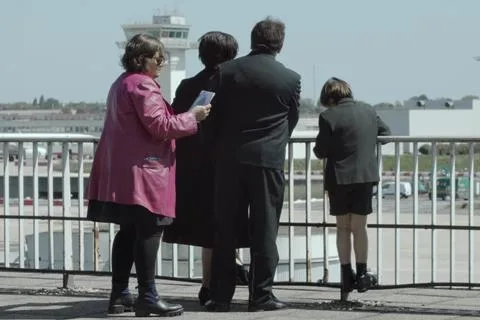Dir: Dominique Cabrera. France. 2024. 104mins Even though it is essentially composed of photographs instead of moving images, Chris Marker’s sci
Dir: Dominique Cabrera. France. 2024. 104mins
Even though it is essentially composed of photographs instead of moving images, Chris Marker’s science fiction miniature La Jetée (1962) continues to enthrall filmmakers and cinephiles alike. Case in point: La Jetée, The Fifth Shot, a fascinating but also somewhat rambling fresh documentary feature about just one shot —or rather photograph— in the miniature. Things kick off when an elderly French man seems to recognise himself as a child in the titular fifth shot, which sets in motion a meandering investigation by director Dominique Cabrera (Corniche Kennedy).
Most appealing for cinephiles on a conceptual level.
La Jetée, The Fifth Shot plays in DOK Leipzig competition; perhaps not coincidentally the festival that awarded Marker’s 1963 opus Le Joli Mai, which was shot at the same time as La Jetée and which is also abundantly excerpted here. Cinematheques and cinephile broadcasters may want to give this a look.
Whilst visiting the Cinémathèque Française with his adult daughter Camille, Jean-Henri thinks he recognises himself as the little boy standing on the railing of the jetty — the notable Jetée of the title — at Orly Airport near the beginning of Marker’s miniature. Jean-Henri comes from a family of so-called pieds-noirs, people of European descent who were born in Algeria during the 130-odd years of French rule. Many moved to France around the time Algeria became independent in 1962, although some had never set foot in this “motherland” (as was the case for Jean-Henri’s family). As is explained in the film, these migrants would come to Orly to watch other flights from Algeria arrive, in the hope they would recognise someone from home.
As it happens, Jean-Henri comes from a enormous family of image-makers and photographers and his cousin, Dominique Cabrera, is a filmmaker who directs this documentary about the investigation into an extremely unlikely coincidence. Cabrera’s first instinct is to try and figure out if Jean-Henri is really the boy in the grainy black-and-white shot. We see him standing next to his parents who, like him, are staring ahead, no doubt looking at a plane coming in. But with all of their backs turned to Marker’s camera, it is challenging to identify them with 100% accuracy. Several other family members as well as photographic evidence from personal archives are brought in to try and build a case.
Most of the action happens in what looks like a dimly-lit editing suite, where researchers and editors are at work while Cabrera talks with her subjects. The conversations are informal, often because she’s speaking to family members but, even so, the way in which the director lays out information is not always immediately comprehensible. Yet a throughline of thinking about images and their meaning, about the doubles that are created when capturing reality, does keep things intriguing.
Indeed, the film is most appealing for cinephiles on a conceptual level. One of the themes of the original La Jetée, for example, is time travel. Cabrera’s film, made 60-odd years after La Jetée but with people who played a role in the miniature looking at much younger versions of themselves, can’t aid but play around a little with the concept too. And besides actual clips from other Marker films, there are a lot of winky inclusions that refer to the iconic filmmaker’s oeuvre. The family history, however, seems to be more engaging for the characters than for viewers. And this is doubly the case for foreign audiences who aren’t at least a little bit aware of French colonial history.
Editing, courtesy of Sophie Brunet and Dominique Barbier, could have also used a bit more rigour, as the film does outstay its welcome at 104 minutes — almost four times the length of Marker’s miniature. As the film was co-produced by Franco-German broadcaster Arte, perhaps a shorter version for television is already in the works.
Production companies: Ad Libitum
International sales: Edmee Doroszlaï [email protected]
Cinematography: Karine Aulnette
Editing: Sophie Brunet, Dominique Barbier
Music: Beatrice Thiriet, Oscar Turbant, Elise Bertrand

COMMENTS